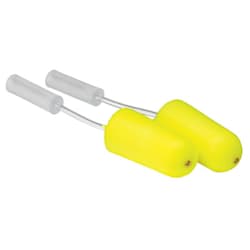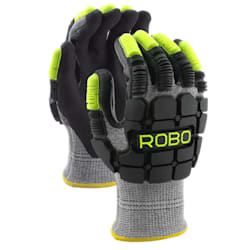Latex Glove Guide
A Complete Guide to Disposable Latex Gloves
Latex is derived from the naturally occurring rubber tree, giving it an elasticity that’s ideal for a variety of uses. As latex manufacturing has evolved, it has become thinner, more versatile and more flexible over time. That translates to a glove that offers serious protection against biohazards while providing superior comfort and dexterity. Check out the information below to see how latex gloves measure up against vinyl and nitrile options so you can choose the best disposable glove to protect your employees and avoid cross-contamination.
What are the advantages of using disposable latex gloves?
Though nitrile and vinyl have risen in popularity, latex gloves are still common. They are very elastic and resistant to tearing while protecting against biohazards like bacteria and viruses.
Some think disposable latex gloves are the most comfortable due to their snug fit and skin-like feel. As a result, they are an excellent choice for tasks that require high touch sensitivity.
Because they are made from naturally occurring rubber, disposable latex gloves are more biodegradable than synthetic gloves.
Latex gloves are typically available in powdered or powder-free options. Powder makes it easier to apply and remove the gloves and helps to absorb perspiration for more comfortable wear. Powder-free latex gloves are appropriate where workers must avoid contamination or allergens.
What is the difference between vinyl, latex, and nitrile gloves?
Latex gloves offer a high degree of protection against chemical and biohazards and more protection against punctures and tears than vinyl gloves. They also fit more snugly to the hand and allow for more stretch, comfort, and dexterity for long periods. However, wherever abrasive materials and tear/puncture hazards are more likely and dexterity is not needed, nitrile gloves may be the best option.
Why are latex gloves different colors?
Disposable latex gloves are available in various colors to protect against cross-contamination in the workplace. Select a different shade for each application or stage of work to ensure that materials, contaminants, or hazards are not transferred from one work area to another. This practice comes especially in handy in food preparation.
Are latex gloves safe to wear?
A study by the Glasgow Dental School showed that workers could use latex gloves for up to three months without compromising the health of their skin. Despite the length of time you can wear a pair of gloves without skin irritation, you should still change to fresh gloves regularly throughout the workday. It's best to apply a new pair of gloves every time you begin a new task to avoid cross-contamination.
Can I use latex gloves for food prep?
Polyethylene, latex, vinyl, and nitrile are all appropriate materials for food prep gloves and the most popular glove materials available. However, you should avoid latex gloves if you or one of your workers has an allergy.
Playtex gloves made from yellow latex often work well for food processing because they're comfortable, easy to slide on and off, and keep hands dry. They also have a lot of tactile sensitivity and puncture resistance. In addition, powder-free white latex gloves are suitable for single-use food service tasks.
Do latex gloves expire?
Nothing lasts forever, not even disposable gloves. Even the most durable glove material eventually breaks down over time. For this reason, latex gloves expire just like any other type of disposable glove.
Most have a shelf life of about three years when stored in a cool area in unbroken packaging with no ozone or ultraviolet exposure. They will often age faster than nitrile gloves because they are typically thinner to offer a more tactile feel. You should throw the gloves away at any sign of tears, cracks, holes, or discoloration.
Are latex gloves reusable?
While non-commercial household activities like light cleaning or crafting may permit reuse, latex disposable gloves should never be reused when handling bodily fluids, food products, or similar substances in any commercial or professional environment.





